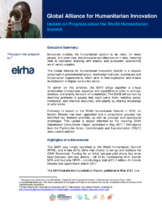This site is inactive as of February 2020. For updated information on an initiative's work, please refer to their own website as listed in their contact details.
Summary
Effective humanitarian response, in the context of an ever-changing landscape, requires continued innovation to meet such rapidly evolving needs, solve problems and effectively utilize limited available resources.
Innovation enables the humanitarian system to do more, for more people, at less cost. To deliver on this objective, the Global Alliance for Humanitarian Innovation (GAHI) connects, mobilizes, and amplifies. It connects by matching problems to people that might solve them, mobilizes social, intellectual, and financial resources, and amplifies by sharing knowledge of what works.
The GAHI’s unique contribution is in addressing the innovation needs of the sector that cannot be effectively tackled by individual actors working on their own. The GAHI will have a multiplier effect, promoting the adoption and scaling of innovative products and processes within new and existing systems and across sectors. In connecting, mobilizing and amplifying, the GAHI will help to maximize the value of humanitarian innovation, thereby benefitting overall humanitarian response and millions of crisis-affected people around the world.
Partners
The GAHI is a network comprised of governmental actors, knowledge institutes, businesses and humanitarian organizations, bringing together a unique combination of resources, expertise and capabilities. List of members: https://www.thegahi.org/

Goals
The GAHI will successfully connect, mobilize, and amplify actors across the humanitarian innovation ecosystem by focusing on six proposed initiatives:
Innovation in Emergencies: Some of the most dynamic innovative tools and processes are developed in emergency contexts, when no other solutions are available. GAHI members will come together to develop a multi-stakeholder innovation function that can exist at the field level in emergency contexts.
Refugees and Energy: There is limited policy and practice on sustainable and clean energy provision within the humanitarian community. This means that the energy needs of millions of displaced people are being inadequately met and not through the most effective or carbon-efficient interventions. The GAHI will establish a system for addressing the energy needs of refugees in a systematized and sustainable way.
Data and Improved Education Outcomes: Crisis situations often present opportunities to ‘build back better‘ by introducing innovations and change to the system, curriculum and teaching/ learning practices, and building construction codes. Data has a critical role to play in strengthening interventions, including those related to pre and post disaster assessment and ongoing coordination. In the context of the education in emergencies work stream, the GAHI will work with multiple stakeholders to promote the improved and principled use of data.
Community Engagement: While there has been a proliferation of community engagement and user-centered design practice within the humanitarian innovation ecosystem, there is a need to systematize this area of practice and to ensure that engagement extends beyond the design phase and is sustained throughout the development of any innovative intervention. Working with leading design firms, the GAHI will successfully bring together its community of members to develop an innovation community engagement kit which will be scaled and adopted across GAHI‘s network.
Global Humanitarian Research and Innovation Prioritisation exercise: As there is increased investment in innovation, and more actors from business and research communities contribute to solving humanitarian challenges, it is essential that actors within the innovation ecosystem understand common challenges, and agree on areas of priority and can avoid duplication. To ensure that investment and energy is used to target the most pressing challenges, the GAHI will use its network and convening power to support the development and use of a global prioritisation exercise.
Data: Many humanitarian organizations use data within their organizations, but lack the frameworks and structures to jointly employ data across organizations. The GAHI will support the promotion of ethical, coordinated, and effective collection, analysis, and use of data for decision making by responders. The GAHI will also work with partners to develop standards for ethical data use consistent with core humanitarian principles.
Resources




 summary
summary partners
partners goals
goals Stakeholder reports
Stakeholder reports resources
resources contacts
contacts